
Sunday August 4, 2024
By Dan Barry
Photographs by Jenn Ackerman
A proposed “Muslim-friendly” community near Minneapolis was called segregationist. The backlash was called Islamophobic. Who gets to define inclusion?
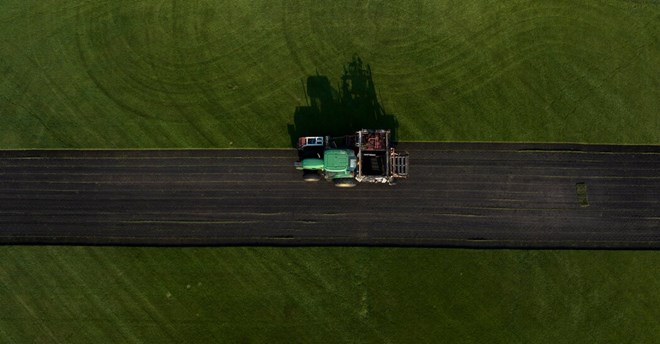
An aerial view of a green field of sod, with a tractor on a path running through the center.
Butch Robinson is done. After dedicating most of his 77 years to growing sod, he just wants to sell his sprawl of green and ease his aching back into the lounge chair of a hard-earned retirement.
That is why Mr. Robinson and the two sons who run the family farm with him, both with nagging backs, were delighted when a developer put down a nonrefundable retainer for 156 of their acres on the fast-growing fringe of the Twin Cities exurb of Lino Lakes, Minn.
The builder’s ambitious plan called for a housing development for 434 homes. It would include shops, restaurants, tennis courts, soccer fields, a park with a pavilion — and a 40,000-square-foot mosque.
So began a conflagration over a small emerald swath of the American dream, fueled by colliding hopes and mutual distrust. At the dispute’s core: clashing interpretations of what inclusion looks like.
It culminated last month with a packed City Council hearing on a proposal to pause development in the precise corner of Lino Lakes that features the Robinson sod farm. Butch Robinson was present, his white hair tucked under a U.S.A. baseball cap. So was the developer. So was the local resident leading the opposition.
The mayor and the four other council members, all white men, sat at a curved table with an American flag drooping behind them. Scowling like a principal anticipating school-assembly misbehavior, the mayor expressed hope for a “good positive session.”
Then everyone stood to pledge allegiance to one nation, under God, with liberty and justice for all.
HAROLD ROBINSON isn’t sure how he became “Butch,” but the nickname has stuck for decades, just as he’s been stuck in pretty much the only place he’s ever known.
His father and an uncle bought the land in the 1940s and turned the wiregrass fields into a farm for vegetables and, eventually, sod. For many years, Butch Robinson lived here with his parents and three siblings in a small home with an outhouse and an unobstructed view. “No neighbors at all,” he said.
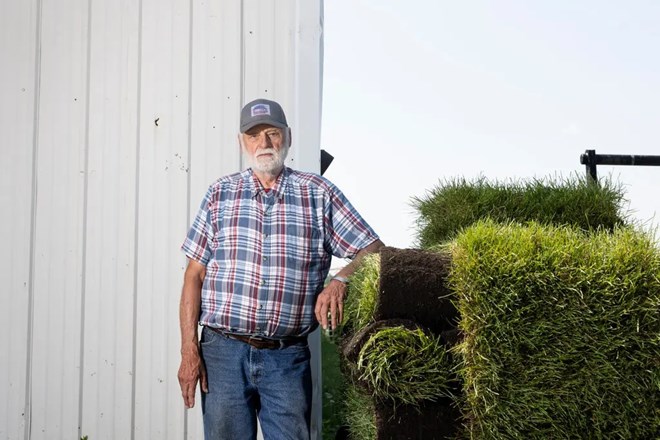
Butch Robinson on his family’s sod farm.
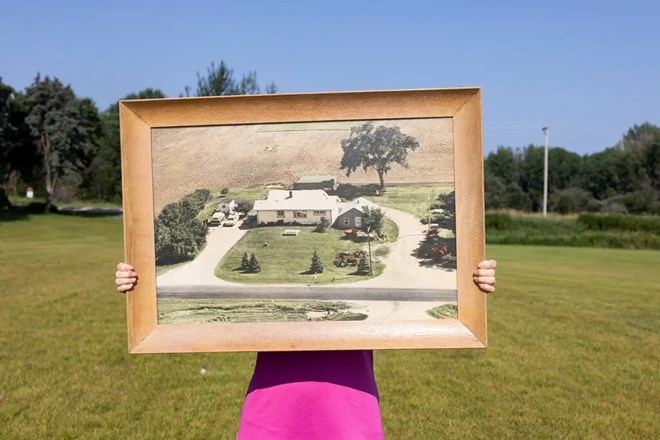
A painting of the original Robinson sod farm.
He helped out with the crop, lost part of a thumb in the process, built a house on adjacent land with his wife, Marge, and worked at the Ford plant in St. Paul. Then his cancer-stricken father died, and Mr. Robinson took over the farm with his brother, who eventually cashed out.
That left Mr. Robinson and two of his sons, Brian and Brad, to run the 260-acre sod operation. They worked together to fertilize, water, spray, mow and harvest the grass, year after year after year, as time redefined the horizon beyond the edge of the sod. The rural Lino Lakes village that Butch Robinson remembered from his childhood — offering little more than a tavern, a store and a schoolhouse — was now a sprawling, Republican-leaning city of 22,000.
In 2006, a developer planning a gated community in the area offered to buy the land. The elder Robinson was beat up from the hard labor, and his sons were not far behind. “So why not move on to the next chapter?” Brad Robinson recalled thinking.
But the plan fell apart amid a calamitous recession that stalled housing construction and killed demand for sod. The Robinsons set aside some of their land for corn and soybeans, and the property remained on the market, attracting occasional attention.
Then, in February, another developer appeared at the farm. He said his name was Faraaz Yussuf, and he saw opportunity.
IN RECENT YEARS, the vibrant Muslim communities of Minnesota have grown, with refugees finding Twin Cities sanctuary from civil strife in Ethiopia, Sudan, Somalia and other countries. Like so many families before them, Muslims are moving up and out, often gravitating to the northern suburbs.
Mr. Yussuf, 36, is a case in point. He moved to Minneapolis-St. Paul from Chicago with his Indian immigrant parents when he was a toddler, attended local public schools and graduated from the University of Minnesota. Recently married, he and his wife, Sarah, live in Blaine, a city with a growing Muslim community that borders Lino Lakes.
Since joining the buildings trade a decade ago, Mr. Yussuf said, he has done remodeling, renovation and roofing. But he has never tackled anything as grand as the development of an entire neighborhood.
“You’ve got to start somewhere,” he said.
Mr. Yussuf started by establishing a company, Zikar Holdings, with a man named Jameel Ahmed, self-described online as a “recognized leader in the Islamic financing mortgage and real estate industry.” Their search for an appropriate development site eventually led them to the Robinson sod farm.
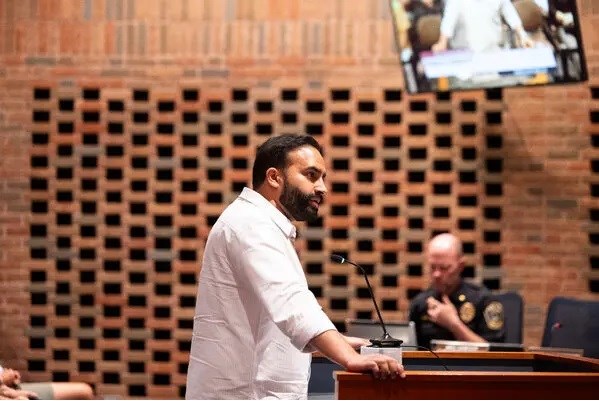
Faraaz Yussuf spoke before a vote on a moratorium on the Madinah Lakes development.
The name of their project, Madinah Lakes, evokes an Islamic pilgrimage site in Saudi Arabia. The development, which Mr. Yussuf said would have about 1,500 residents, would include what he called the “full life-cycle of homeownership,” from starter homes to senior condominiums, laid out amid trees, lakes and gardens. There would be day-care and banquet facilities, restaurants and cafes, all anchored by a mosque with a 10-acre footprint.
Mr. Yussuf emphasized that the development would abide by fair-housing laws. It would be “Muslim-friendly,” he said, but not exclusively Muslim — “just like a hotel is family-friendly or L.G.B.T.Q.-friendly.”
“Much of America was founded on communities built around religious organizations,” Mr. Yussuf said. “That’s how neighborhoods were built.”
In mid-March, Zikar Holdings created a website for Madinah Lakes that included a general concept for the development and a short video. The company, which had been in discussions with city officials but had yet to submit formal plans, also said it would be accepting refundable $10,000 deposits on lots.
The video spread like wiregrass in Lino Lakes.
ONE DAY IN LATE MARCH, Luke Walter’s wife, pregnant with their third child, alerted him to a website for what appeared to be a Muslim-centric development proposed for land just a short drive from the home the couple bought in 2017. At first he thought the idea of a religion-specific neighborhood was a prank, or even a scam.
“Is that allowed?” he recalled thinking.
Mr. Walter, 42, a British immigrant who works in customer service, said the proposal raised the familiar worries about increased traffic, environmental impact and overdevelopment, especially since another builder had recently floated the idea of an “active adult community” on land near the Robinson sod farm.
But Mr. Walter summed up his biggest concern in one word: “Segregation.”
The Madinah Lakes proposal was clearly intended for Muslims, he said, and those not Muslim were unlikely to feel welcome. “So that is segregation by choice and segregation by design,” said Mr. Walter, who noted that he comes from a “multi-faith, multi-ethnic family” that includes a sister-in-law and brother-in-law who are Muslim.
On March 25, with the Madinah Lakes website the talk of Lino Lakes, a city councilman, Michael Ruhland, filed an online request to add an item to the council’s next work-session agenda. Expressing concern about the city’s water supply, infrastructure and the “tons of developers” seeking to build houses, he called for a moratorium on residential development.
The request was filed just a few hours before a City Council meeting that Mr. Yussuf said the city’s community-development staff had suggested he attend to briefly introduce his plan.
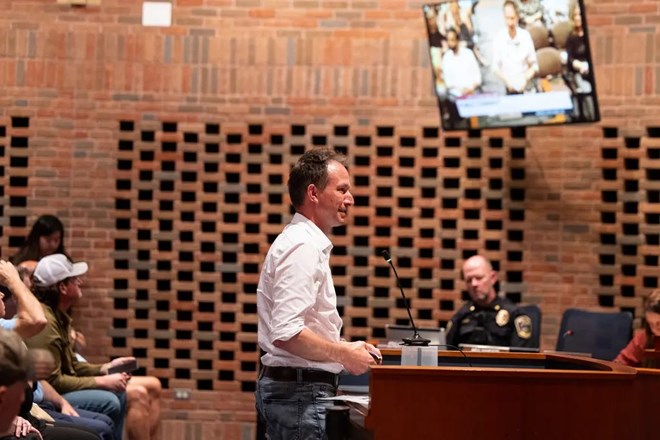
Luke Walter became the opposition’s spokesperson.
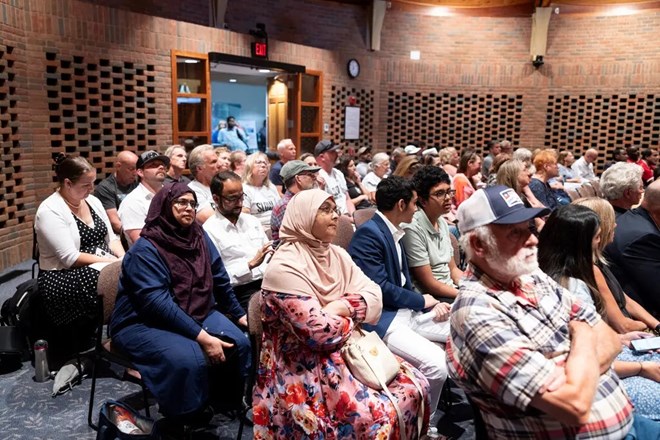
Butch Robinson, right, at a crowded City Council hearing.
Dozens packed the council meeting. Many came to oppose a housing plan that had not been formally proposed. City officials began by assuring everyone that any land-use application to develop the Robinson property would undergo standard rigorous review.
When the public was invited to speak, Mr. Yussuf, a dark-bearded man with a calm affect, introduced himself and said he was eager to dispel any misconceptions. “Our project aims to be one that is inclusive, open to everyone and promotes peace and harmony,” he said.
Then Mr. Walter, emerging as the opposition’s spokesman, began by criticizing the developer for not being “particularly respectful to the community.” Wiry and energetic, he went on to question how others could feel welcome in a neighborhood that was clearly for one specific community. It would, he said, create “a divided city.”
Mr. Walter walked out of the room to applause. Mr. Yussuf remained seated, feeling, he later said, “uncomfortable.” And the dispute over the meaning of inclusion was on.
At some point Brad Robinson received a call from a high school acquaintance who bluntly asked, “Is it true you’re selling to the Muslims?”
“Yeah,” Mr. Robinson recalled answering. “What’s the problem?”
“We’re not going to let that happen.”
THE OPPOSITION quickly coalesced. Mr. Walter took charge, helping to create a “Love Lino Lakes” page on Facebook and leading an anti-development committee that held its organizational meeting in early April.
The first order of business “was to reconfirm our opposition to Islamophobia,” Mr. Walter recalled. “We knew absolutely that objecting to a development of this nature was going to be a flashpoint. The optics are terrible.”
Growing to more than 1,000 members, the group established several subcommittees, including one for “Slow the Grow” merchandise that would pay for lawn signs and legal advice. It also began building the case that Madinah Lakes would be separate, apart — a city within a city.
At one point, a teenager who opposed the project conducted an interview with Mr. Yussuf through the ruse of a supposed school project. According to Mr. Walter, the developer was recorded saying he envisioned successful Muslims coming home to see people who “look like them, talk like them and worship like they do.”
Mr. Walter included this quote in a letter to the City Council and local law-enforcement authorities that questioned Mr. Yussuf’s past. To begin with, Mr. Walter pointed out, the developer’s name was actually Faraaz Mohammed, not Faraaz Yussuf. And in 2013 he had pleaded guilty to a felony: theft by swindle.
Mr. Yussuf — or Mr. Mohammed — was convicted of forging the name of his boss, the owner of a cleaning-supply business, for checks written to himself or to cash, amounting to $20,000. (Mr. Yussuf says he was 23 at the time and under the impression that he had the employer’s permission to sign checks to vendors and to himself.)
He served 90 days of a one-year prison sentence. The experience contributed to the breakup of his first marriage and humiliated his family; his grandfather had been a well-respected judge in India. Hitting bottom, he said, meant that “the only way to go from here is up.”
To start fresh, Mr. Yussuf said, he informally changed his name and successfully petitioned to have his felony reduced to a misdemeanor. He entered the building trades and, he said, did well financially.
But his opponents sharply challenged the depth and success of Mr. Yussuf’s development experience. In his letter to law-enforcement authorities, Mr. Walter asserted that the developer was “currently involved in an ongoing theft by swindle” — based on soliciting $10,000 deposits for land lots he didn’t own — and requested an investigation into the man’s “fraudulent and criminal activities.”
Mr. Yussuf seemed unfazed when shown the letter, saying he was clearly living rent-free in the opposition’s collective head. “They can scrub and find some of the negative stuff in my background, but I’m pretty content where I am,” he said. “I’m sure it’s been brought up to you that I live in my parents’ basement?”
Does he?
“I do,” Mr. Yussuf said. He added: “It’s a phenomenal basement.”
THE MADINAH LAKES proposal moved through the governmental review process of Lino Lakes, as did the proposal for a moratorium on the city’s northeast quadrant, encompassing the Robinson sod farm. The public hearings often attracted hundreds of people who lined up for seats under the watchful eyes of police officers.
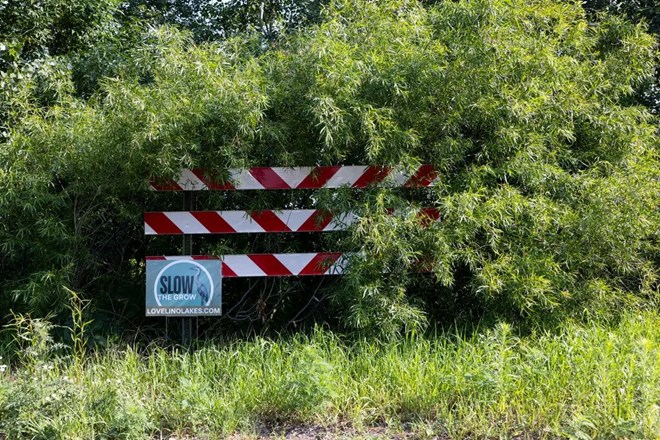
A “Slow the Grow” movement began building the case that Madinah Lakes would be a city within a city.
The growing acrimony tested the serenity implied by the city’s seal that loomed over the council’s proceedings, depicting a blue heron against a stand of grass. For example, whenever Mr. Yussuf spoke, Mr. Walter would leave the chambers. When later asked whether the gesture might convey intolerance, he justified his walkouts by saying the developer was a “liar” unworthy of his respect.
“And, honestly, I want to get to him,” Mr. Walter said.
Even the small tree-shaded hill outside City Hall became a battleground. At first, the development’s supporters gathered there to chat and strategize — until opponents began arriving early to stake their claim with lawn chairs, signs and snack tables. It became known as “taking the hill.”
The Love Lino Lakes organization was called a hate group by one of the Robinsons. And the state chapter of the Council on American-Islamic Relations, a Muslim civil rights organization also known as CAIR, asserted that the project had faced “significant opposition fueled by Islamophobic sentiment,” and was being treated differently from other proposals.
Jaylani Hussein, the chapter’s executive director, said Lino Lakes is “not the most diverse city” — it is 85 percent white — and described its position as, “You can have the mosque, but not the houses, or you can have the houses, but not the mosque.”
Mr. Yussuf provided the City Council with dozens of screen shots from various online forums, including Love Lino Lakes. While many comments expressed routine concerns or argued against creating a separate community (“America is a melting pot. So melt!”), others smacked of bigotry, including these posted by Lino Lakes residents:
They don’t need to be in a mosque five times a day like they claim. I used to work for a nearby county and they stop and kneel in corridors to pray. They’re full of malarkey. …
They treat their women like garbage. So why would any women back up any Muslim man. …
We the people will stop you and drive you out of Lino Lakes. I’m a veteran and I will tell you now the people leading this project are “wolves in sheep’s clothing.” …
Why does nobody mention 9/11. Because they are too afraid of being labeled Islamophobic. You all probably don’t want me showing up to any meetings. I am NOT AFRAID TO SAY I don’t trust anything or anyone involved in this Muslim-centric ideology in my backyard. PERIOD. …
Mr. Walter, an administrator of the Love Lino Lakes page, defended many of the statements as fair comment or simply ignorant. But he agreed that more than a dozen sank to racism, including several on the Love Lino Lakes site, and said that offenders had been warned, suspended or banned.
Still, he argued that the prejudicial fear was “coming from the other direction,” and that the developer and his supporters were the ones promoting exclusion.
“What is the fear of buying one of the 67 single-family homes that are currently open and available for purchase in Lino Lakes?” Mr. Walter asked. “Buy one next door to me. There’s two on our street.”
The ugliness continued.
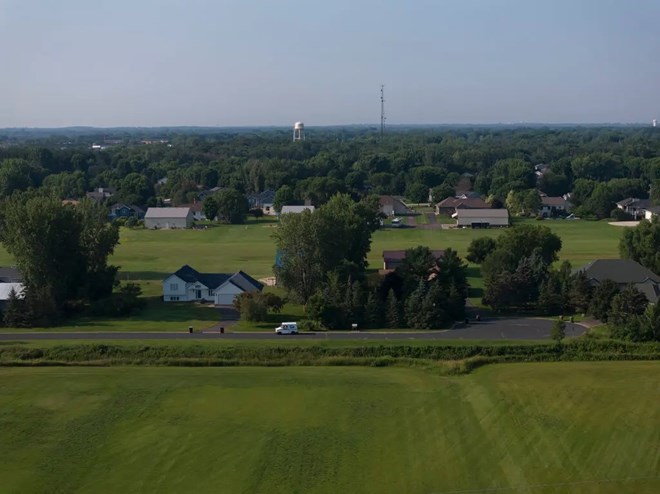
Opposition to the development questioned whether everyone would feel welcome in the community.
Dean Dovolis, a veteran Minneapolis architect who helped design the Madinah Lakes plan, recalled feeling harshly judged at one hearing as the only white person speaking in favor of the project. “I felt like I lost 50 years of justice going up there,” he said.
He became what he mordantly called “the questionable architect” and the subject of ethics complaints lodged with the American Institute of Architects.
Mr. Walter said that he, too, was victimized, his employer flooded with accusations that he had been posting Islamophobic and racist comments. He was suspended for a day, he said, until an internal review determined that the charges were baseless.
He also said he had seen two strangers parked outside his home on two consecutive nights. “I’m not going to get into racial profiling,” Mr. Walter said. “I’m not going to describe the occupants of the car. But I’m left in no doubt that they are associated with this development.”
People are afraid, he said. “We’re standing in the way of a multimillion-dollar deal, and money and religion are dangerous motivators.”
HOURS BEFORE the City Council meeting of July 8, Muslims knelt in prayer in a City Hall alcove, while on the small hill outside, two dozen people staked their claim with lawn chairs and “Slow the Grow” signs.
Among those taking seats in the council chambers were Butch Robinson, his son Brad, and his son Brian’s wife, Bridget. Days earlier, on the Fourth of July, their sod business had received an Islamophobic email that ended, “Sell your land to someone else.”
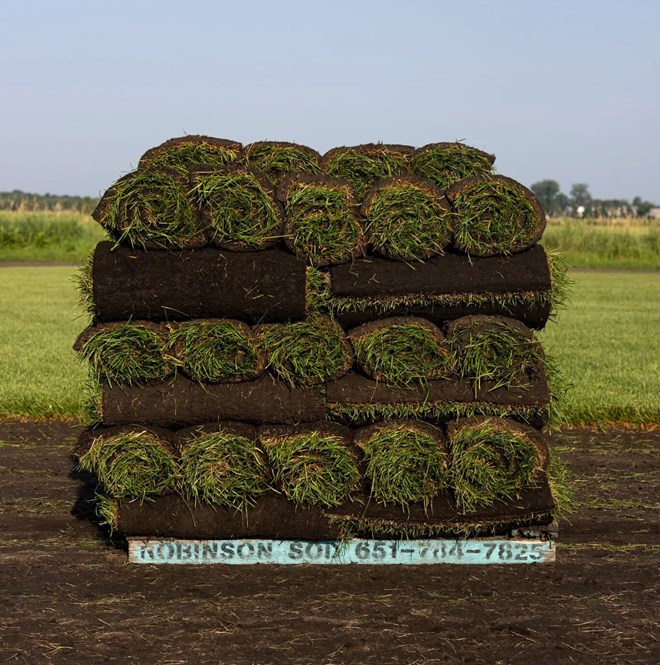
Butch Robinson has devoted most of his life to sod.
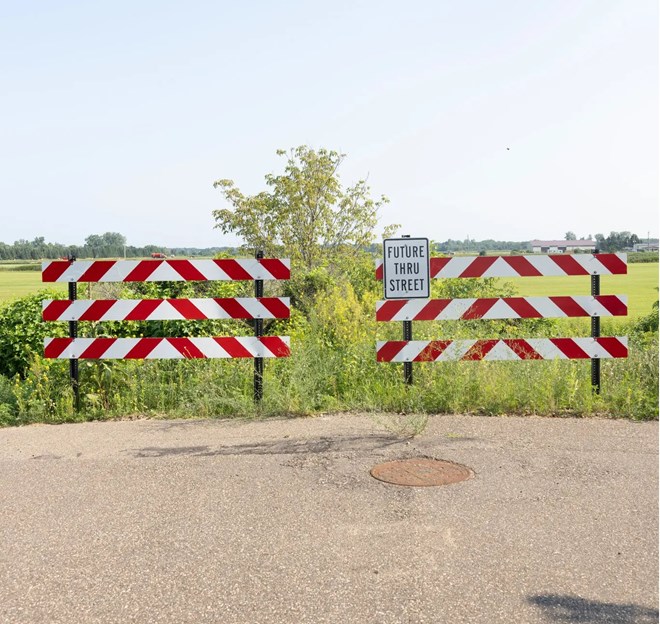
The edge of a subdivision that abuts the farm.
After the Pledge of Allegiance came public comment on the proposed one-year moratorium allowing further study of the area “generally referred to as ‘the Sod Farms.” A succession of speakers approached a lectern bracketed by Mr. Yussuf sitting on one side and Mr. Walter on the other.
“Why are they targeting here?” one resident asked, leaving unclear who “they” were. Mr. Walter, meanwhile, decried “shady developers” and asserted widespread support for a moratorium.
“We demand to be heard,” he said.
But moratorium opponents urged the council to consider being remembered for choosing to be welcoming. Some cited what they considered to be examples of a compromised process. And since the vague plan for an “active adult” development hadn’t moved forward, they said, the moratorium clearly was directed at Mr. Yussuf’s proposal.
“A premeditated murder of this project,” said Mr. Dovolis, the architect.
When Mr. Yussuf spoke, Mr. Walter once again left the room. The developer said the process had so far been unfair, but he intended to continue working with the city. He also noted that he was sponsoring a roadside cleanup effort in Lino Lakes; all were invited.
When Mr. Yussuf sat down, Mr. Walter returned.
Mr. Ruhland, the councilman who had suggested a moratorium, said the city’s deliberate approach reflected careful planning, protected the interests of taxpayers and gave the inexperienced developer time to refine his proposal. “Slinging accusations of Islamophobia,” he said, was “not a great way to start a relationship with a city.”
Councilman Chris Lyden, a bearish man in a summery short-sleeve shirt, delivered the harshest words. He began with a slap at newcomers (“Our city’s name is not pronounced LEE-no Lakes, it’s LINE-o Lakes”); asserted that, like the Rev. Dr. Martin Luther King Jr., he judged people by character, not skin color; and accused the Council on American-Islamic Relations of trying to intimidate city officials.
CAIR’s website may preach mutual understanding and justice, Mr. Lyden said, but “they make no mention of the Oct. 7 attack on Israel.”
“That’s bullshit!” Bridget Robinson shouted.
Ignoring the disruption, Mr. Lyden continued, “No one comes into this council chambers, defecates and then has the audacity to blame the smell on others.”
The moratorium passed, 4 to 1. Mr. Walter hurried out to the hill to exchange hugs and high-fives with other Madinah Lakes opponents, while Mr. Yussuf commiserated with his supporters a few yards away.
Mr. Walter later said he would continue opposing what he called a segregated community. And yes, he said, he might run for office someday.
Mr. Yussuf, meanwhile, said he had returned nearly all the deposit money but would continue with his development proposal. “We plan to be a part of the community and get integrated,” he said.
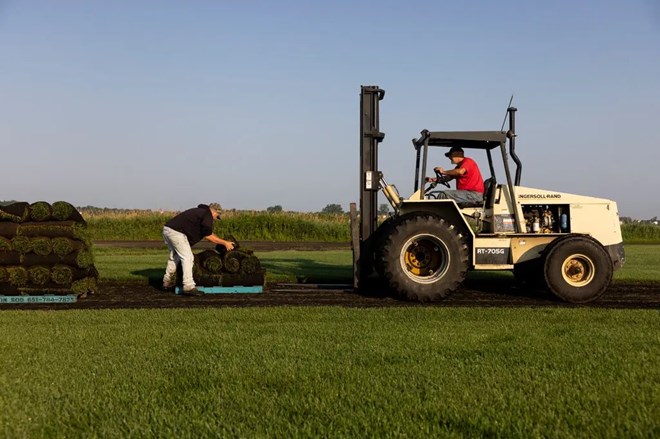
Brad Robinson rolls sod on the Robinsons’ 260-acre operation.
It all meant that Butch Robinson’s plans for his life’s next chapter would have to wait. On the stifling morning after the vote, the aging farmer stood beside a tractor, resigned to more years of delay. He gazed into a sod-green expanse now fringed by housetops and shrugged, as if to say there’s no way to keep the grass from growing.
Alain Delaquérière contributed research.
Dan Barry is a longtime reporter and columnist, having written both the “This Land” and “About New York” columns. The author of several books, he writes on myriad topics, including New York City, sports, culture and the nation. More about Dan Barry